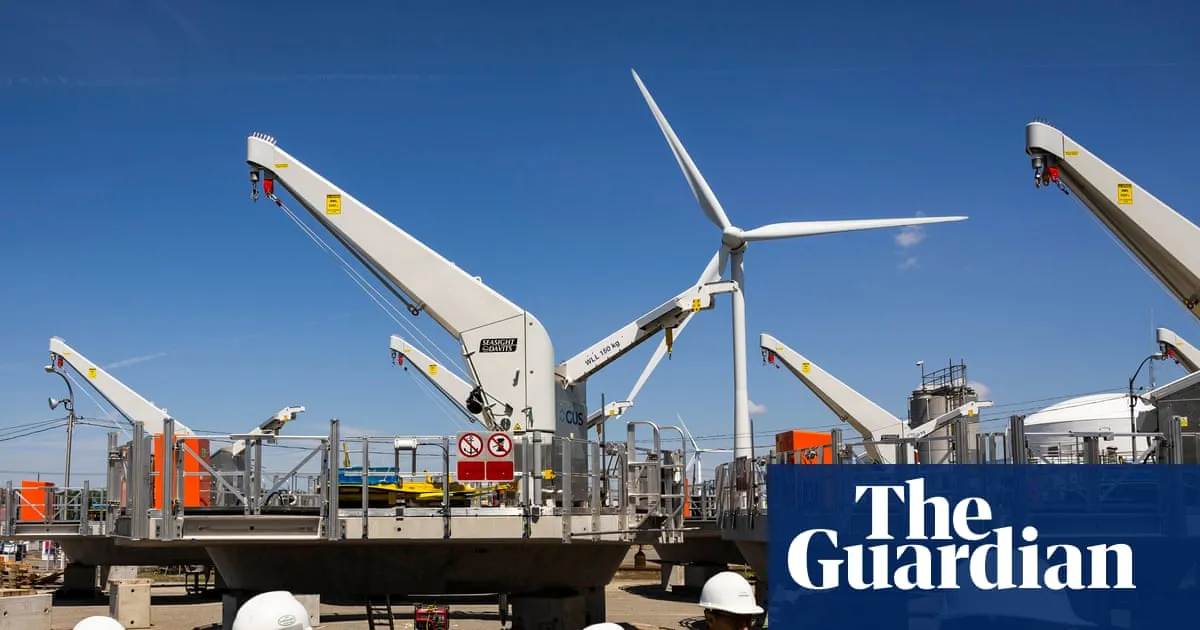
The Democratic governors of Rhode Island and Connecticut have vowed to challenge a recent order from the Trump administration that has halted work on the nearly completed Revolution Wind project. This offshore wind farm, which was expected to be operational by next year, is currently about 80% complete, with 45 of its 65 turbines already installed. The project is being developed by the Danish company Ørsted.
The U.S. Bureau of Ocean Energy Management (BOEM) issued a letter on Friday directing Ørsted to “halt all ongoing activities.” According to Matt Giacona, the acting director of BOEM, the agency is concerned about “the protection of national security interests in the United States.” He emphasized that Ørsted may not resume any activities until a thorough review of the project is completed.
This review comes after years of federal and state approvals for the Revolution Wind project. Giacona noted that the project must now be re-evaluated in light of an order from Donald Trump during his second term, which called for the reconsideration of existing wind energy leases.
Rhode Island Governor Dan McKee criticized the stop-work order, stating that both he and Connecticut’s Governor Ned Lamont will explore every possible avenue to reverse the decision that halts work on what is set to power over 350,000 homes. Senator Chris Murphy, a Democrat from Connecticut, linked this decision to Trump's alleged dealings with oil industry executives, where he reportedly traded campaign donations for favorable regulatory actions.
Murphy expressed his outrage, stating, “This is a story of corruption, plain and simple. President Trump has sold our country out to big corporations, with the oil and gas industry at the top of the list.” He pledged to collaborate with Governor Lamont and his colleagues to pursue all legal avenues to reinstate the project.
Since taking office, Trump has enacted sweeping measures that favor fossil fuels while obstructing renewable energy initiatives. Throughout his presidency, he has expressed a strong aversion to wind power, claiming that offshore turbines ruin the views at his golf courses and promoting the unfounded belief that “the noise causes cancer.” Recently, he labeled wind and solar energy as “THE SCAM OF THE CENTURY!” in a social media post, stating his intention to block wind and solar projects deemed harmful to agriculture.
Rhode Island’s Attorney General, Peter Neronha, voiced his concerns that the cancellation of the Revolution Wind project jeopardizes the state’s Act on Climate law, which aims to leverage renewable energy in the fight against global warming. With scientists advocating for immediate action on renewable energy to mitigate climate change’s most severe consequences, the halt on this project is particularly alarming.
The Revolution Wind project, located over 15 miles south of the Rhode Island coast, is poised to become the first commercial-scale offshore wind farm for both Rhode Island and Connecticut. This project is crucial for these densely populated states, which have limited space for land-based energy initiatives.
While the halt has drawn ire from state officials and clean energy advocates, the non-profit organization Green Oceans, which opposes the offshore wind industry, celebrated the Trump administration’s decision. They expressed gratitude for what they perceive as meaningful action to protect the fragile ocean environment off the coasts of Rhode Island and Massachusetts.
This is not the first significant offshore wind project halted by the Trump administration; a similar stop was placed on the Empire Wind project in New York, which resumed construction after intervention from state officials.
Kit Kennedy, managing director for the power division at the Natural Resources Defense Council, criticized the administration’s stance, stating, “This administration has it exactly backwards. It’s trying to prop up clunky, polluting coal plants while doing all it can to halt the fastest-growing energy sources of the future – solar and wind power.” The ongoing battle over the Revolution Wind project exemplifies the larger struggle for the future of clean energy in America, as states work to meet their climate goals amidst federal opposition.
As the situation develops, the outcome of this project will have significant implications not just for Rhode Island and Connecticut but for the entire landscape of renewable energy in the United States.